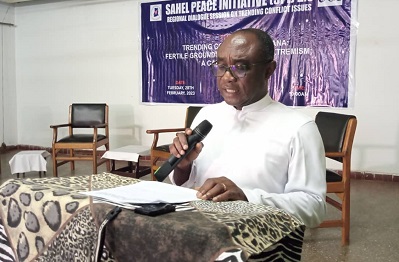
The Director at the Governance, Justice and Peace Directorate of the National Catholic Secretariat, Very Rev Father Clement Kwasi Adjei has called for concerted effort at addressing internal conflicts around chieftaincy, economic and other social issues in the country in order not to serve as fertile grounds for violent extremism.
He noted that activities of terrorists and extremists in neighbouring countries such as Burkina Faso, Togo, among others, put Ghana at risk and was therefore imperative that stakeholders took immediate action to protect the nation through amicable and timely conflict resolution.
He stated that issues such as chieftaincy and tribal conflicts as well as illicit trafficking made communities weaker and less resilient and served as possible pull factors for Jihadists .
Rv. Fr. Adjei stated this on Tuesday at Wa in the Upper West Region during a regional dialogue session on trending conflict issues in northern Ghana under the Sahel Peace Initiative (SPI) by the Catholic Relieve Services (CRS).
The Dialogue which was on the theme: “Trending Conflicts in Ghana: Fertile Grounds for Violent Extremism; A call for Action” brought together traditional rulers, religious, leadership of market women, persons with disabilities, the clergy, among others.
The SPI which was at the instance of the Catholic Church aimed at promoting peace and building a cohesive society to ensure that individuals living in Ghana experienced greater levels of peace, social cohesion and resiliency.
Rv Fr Adjei said the five northern regions, namely, Upper West, Upper East, Northern, North East, Savannah and Northern Regions were at risk of violent extremism as they bordered the Sahel Regions and shared more than 500 kilometres of borders with Burkina Faso, a country under insurgency.
“As we speak, the Bawku District which borders Burkina Faso and Togo and the Sissala East District which borders Nazinga Forest in Burkina Faso have been experiencing increasing spillover of violent extremist related activities”, he noted with concern.
Economic disparities, he noted further, was also a recipe for conflict and needed to be addressed by governments by creating opportunities for all Ghanaians regardless their background or circumstances, in the areas of education, job creation and entrepreneurship.
“We need to strengthen social cohesion and promote tolerance and respect for diversity by building bridges between different communities, promote dialogue and understanding, unity and cooperation and do away with hate speech and incitement to”, he enumerated.
In a speech on his behalf, the Upper West Regional Minister Dr Hafiz Bin Salih said government had put in place necessary measures to ensure that citizens were better protected.
He encouraged the public to play their part through vigilance and reporting of suspicious people and activities to the appropriate authorities for action, and also charged religious leaders to ensure their sermons were devoid of messages that fueled agitations and dissentions.
Some participants expressed concern about the springing up of youth camps in the region with membership mostly made up of unemployed young persons who were ready to accept any task to earn an income.
They were of the view that taking security measures included providing permanent decent jobs for the youth without recourse to nepotism.
FROM LYDIA DARLINGTON FORDJOUR, WA
